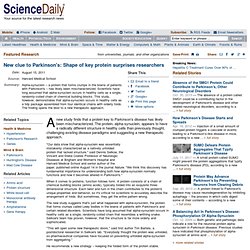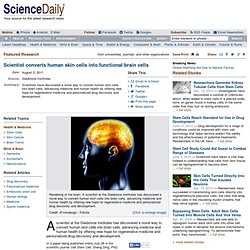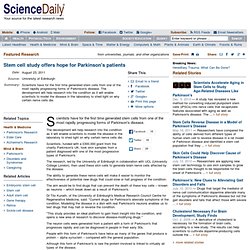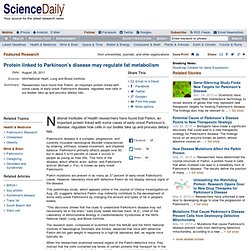

New clue to Parkinson's: Shape of key protein surprises researchers. A new study finds that a protein key to Parkinson's disease has likely been mischaracterized.

The protein, alpha-synuclein, appears to have a radically different structure in healthy cells than previously thought, challenging existing disease paradigms and suggesting a new therapeutic approach. "Our data show that alpha-synuclein was essentially mistakenly characterized as a natively unfolded protein that lacked structure," said Dennis Selkoe, the Vincent and Stella Coates Professor of Neurologic Diseases at Brigham and Women's Hospital and Harvard Medical School and senior author of the paper, published online August 14 in the journal Nature.
"We think this discovery has fundamental importance for understanding both how alpha-synuclein normally functions and how it becomes altered in Parkinson's. " When it comes to proteins, function follows form. A protein consists of a chain of chemical building blocks (amino acids), typically folded into an exquisite three-dimensional structure. Scientist converts human skin cells into functional brain cells.
A scientist at the Gladstone Institutes has discovered a novel way to convert human skin cells into brain cells, advancing medicine and human health by offering new hope for regenerative medicine and personalized drug discovery and development.

In a paper being published online July 28 in the scientific journal Cell Stem Cell, Sheng Ding, PhD, reveals efficient and robust methods for transforming adult skin cells into neurons that are capable of transmitting brain signals, marking one of the first documented experiments for transforming an adult human's skin cells into functioning brain cells. "This work could have important ramifications for patients and families who suffer at the hands of neurodegenerative diseases such Alzheimer's, Parkinson's and Huntington's disease," said Lennart Mucke, MD, who directs neurological research at Gladstone. "Dr. The work was done in collaboration with Stuart Lipton, M.D., Ph.D., who directs the Del E.
Dr. Dr. Dr. Stem cell study offers hope for Parkinson's patients. Scientists have for the first time generated stem cells from one of the most rapidly progressing forms of Parkinson's disease.

The development will help research into the condition as it will enable scientists to model the disease in the laboratory to shed light on why certain nerve cells die. Scientists, funded with a £300,000 grant from the charity Parkinson's UK, took skin samples from a patient diagnosed with one of the most progressive types of Parkinson's. The research, led by the University of Edinburgh in collaboration with UCL (University College London), then used these skin cells to generate brain nerve cells affected by the disease. The ability to generate these nerve cells will make it easier to monitor the effectiveness of potential new drugs that could slow or halt progress of the condition.
The aim would be to find drugs that can prevent the death of these key cells -- known as neurons -- which break down as a result of Parkinson's. Protein linked to Parkinson's disease may regulate fat metabolism. National Institutes of Health researchers have found that Parkin, an important protein linked with some cases of early-onset Parkinson's disease, regulates how cells in our bodies take up and process dietary fats.

Parkinson's disease is a complex, progressive, and currently incurable neurological disorder characterized by shaking, stiffness, slowed movement, and impaired balance. Parkinson's primarily affects people over 50, but in about 5 to10 percent of cases it occurs in people as young as their 20s. This form of the disease, which affects actor, author, and Parkinson's activist Michael J. Fox, is known as early-onset Parkinson's. Parkin mutations are present in as many as 37 percent of early-onset Parkinson's cases. This preliminary study, which appears online in the Journal of Clinical Investigation on Aug. 25, suggests defective Parkin may indirectly contribute to the development of some early-onset Parkinson's by changing the amount and types of fat in people's bodies.
Dr.